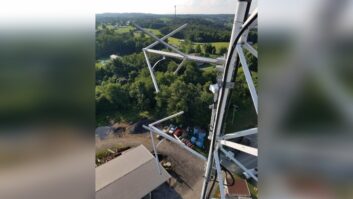
WASHINGTON — The power levels being discussed may be low; but passions on the issue run high.
The FCC is seeking to license more low-power FM stations while at the same time reducing a backlog of roughly 6,500 pending translator applications — and developing a way that these secondary services can coexist.
The commission now is reviewing approximately 200 comments filed in its Third Further Notice of Proposed Rule Making, RM-11338. This article provides a sampling.
Several organizations wrote that they support the spirit, if not every detail, of the commission’s proposed approach to the situation. It laid out a tiered market-based approach that would locate new LPFMs and FM translators in the top 150 markets using specific LPFM “channel floors” recommended in those markets.
Many filers suggested modifications to the plan that would tip the scales in favor of either more LPFMs or FM translators.
One angle drawing a lot of attention is the commission’s plan to dismiss pending FM transmitter applications in top markets where the number of possible LPFMS would fall below projected “channel floors.”
The agency also sought comment on whether to expand the number of AMs that can be allowed to transmit using FM translators; that number hovers around 500 at present. And several commenters revived the idea of letting radio use analog TV channels 5 and 6.
We start with excerpts of comments about the feasibility of opening an LPFM application filing window by the summer of 2012.
Give Enough Time for LPFMs
Prometheus Radio Project, Future of Music Coalition & United Church of Christ wrote:
We emphasize that one of the most important things the commission can do to ensure a successful LPFM service is give potential applicants adequate time to apply for construction permits. Accordingly, we ask the commission to open an LPFM application filing window no sooner than six to nine months after the publication of the final LPFM rules, and to seek comment on the use of multiple filing windows as was done in the 2000 filing process. …
If the rules are published no later than January 2012, then July 2012 would be the soonest reasonable date for an application window; and August, September, or October would be more likely to ensure good outcomes.
Perhaps Multiple Windows Are Needed
From Michelle (Michi) Eyre, founder of REC Networks:
REC agrees with Prometheus that multiple filing windows may be warranted. We need to make sure that the territory that is designated for each window does not cause disparity to another part of a metropolitan area that is in another state.
For example, a filing window where Nebraska and Iowa are in different filing windows and where Nebraska is in the first window may disadvantage Council Bluffs, Iowa, because Omaha was allowed to file first. With more urban availability of LPFM, this issue is now more important than ever.
Don’t Dismiss All Pending Translator Apps …
Several executives contributed to a filing by the National Association of Broadcasters. Executive Vice President of Legal and Regulatory Affairs Jane Mago headed the list:
NAB believes the proposal jumps too quickly to dismiss pending applications for FM translators, which are often integral to the ability of many FM licensees (and AM as well) to serve their local audiences and fulfill their public interest commitments.
We emphasize, however, that the proposed approach could be a reasonable first step, if it is improved to more precisely limit the adverse effects on broadcasters with long-pending FM translator applications to situations where grant of those applications would preclude LPFM applications. …
The Arbitron Metro more accurately reflects the actual radio marketplace than does the newly-created “grid,” and is the longstanding, commission-endorsed regulatory benchmark for radio market definition. Use of Arbitron Metros, rather than the grid, would improve the precision of any determination about the balance between LPFM and FM translator opportunities in a market, consistent with the LCRA.
A filing by National Public Radio was signed by several executives, led by Terri Minatra, acting vice president for legal affairs, general counsel and secretary:
The measures the commission proposes to adopt … would cast aside FM translator services that many applicants have spent considerable resources preparing to provide. Such an outcome would be harmful to future public radio service. It is also unnecessarily harsh. …
Rather than specifying minimum numbers of LPFM station opportunities on a market-specific basis and summarily dismissing or processing FM translators thereafter, the commission should first address the backlog of pending FM translator applications to identify those which propose an FM translator service the applicant actually intends to provide. It should do so by investigating the few entities that filed massive numbers of FM translator applications to determine whether they possessed the financial means and service plans to construct and operate the proposed stations. If the investigation confirms that an entity has been engaged in spectrum trafficking, the commission should dismiss the entity’s pending applications, in addition to any other action the circumstances may warrant.
… Process Them Using Interference Analysis
Comments from National Translator Association President Byron St. Clair, submitted by attorney George R. Borsari Jr. of Borsari & Paxson:
Interference is a technical matter that is an identical problem for both LPFM and FM translator stations. Rules adopted to address interference should therefore be the same for both services and should employ the best technology available in order to open up the maximum possible number of channels.
The best technology currently available requires the use of terrain-dependent interference protection following the OET [FCC Office of Engineering and Technology] Bulletin 69 plan that is in use for TV and specifically for LPTV and TV translators. It is only necessary to review the interference ratios to be used in an FM version of OET Bulletin 69. …
NTA therefore proposes that the commission put in place a true terrain-dependent interference analysis program and process the now-pending FM translator applications using it and see how many of the applications survive. A better judgment can then be made as to how many, if any, FM translator applications it is necessary to dismiss.
Go Ahead & Dismiss
John Lombardo, Chicago Independent Radio Project, writes:
I strongly support the idea of dismissing all pending translator licenses in markets where a set LPFM “floor” could not be met if additional translator licenses were granted. I’d also ask, moving forward, that the commission make sure there is room for urban LPFMs in the country’s largest markets by providing opportunities for waives for second adjacent channels, as called for in the Local Community Radio Act.
Market-Based Approach to Translator Processing Is Justified
Educational Media Foundation, submitted by attorney David Oxenford of Davis Wright Tremaine, states:
The market-specific approach to the decision as to whether to dismiss applications pending from the 2003 FM Translator Window has been accepted by many of the major parties filing comments in this proceeding. …
The real issue raised by the vast majority of the comments is not with the question of how to move forward — there seems to be general agreement that some form of the FCC’s market-by-market review of LPFM and translator availability is an acceptable methodology. Instead, the real issue seems to be whether the FCC made the right “cut” in deciding how many of the applications from the 2003 FM translator window can be processed, and how many must be dismissed to preserve opportunities for LPFM.
Naturally, the comments of LPFM proponents … argue that there should be more protection for LPFM opportunities, and hence more dismissals of translator applications. However, these comments all seem to proceed from a reading of the Local Community Radio Act that presupposes that the only goal of the statute was the promotion of LPFM stations. In fact … the LCRA does not read that way. Instead, the LCRA seeks to promote opportunities for both new LPFM and new FM translators. …
Thus, a wholesale dismissal of the translator applications is not warranted. …
Market Approach Needs Better Balance
Media Watch, submitted by Director and Founder Ann J. Simonton:
With a decision for the FCC to process the translators in our area, the FCC will — for the most part — be giving the people who already have frequencies in the area extra channels. KLOVE/Air 1 network could go from having seven channels to having a maximum of 11 radio channels. And in the end there would be no room for not even one LPFM station located in downtown Santa Cruz. We urge the FCC to optimize its current proposed rulemaking to better balance LPFM and translator licensing.
‘Channel Floors’ Overestimate LPFM Availability
Prometheus, REC Networks and Common Frequency stated in a joint filing:
REC along with our allies Common Frequency and Prometheus Radio Project … have invested a lot of time and effort into doing a thorough analysis of the commission’s market-based channel floor proposal. … [We] felt that the 30 x 30 minute study area for most large, medium and small markets were over-proportionate and did not accurately represent the urban areas they intended to protect.
LPFM advocates encourage the commission to use its market-by-market analysis, but to revise its methodology for estimating future available LPFM stations by using a 21×21 minute grid. In addition, we urge an increase of 25 percent to the LPFM channel floors.
Don’t Use Smaller Grid
On the question of market definitions, Educational Media Foundation stated:
The [LPFM proponents’] maps substantially understate the size of the Arbitron Metro Markets that are used for virtually all FCC definitional issues for radio markets. In fact, in connection with the proposed dismissal of FM translator applications from the 2003 Window, the LPFM proponents do not seem to suggest that the applications for translators that will serve areas in an ArbitronMetro, but will be located outside the urbanized area, be preserved. Instead, they seem to beurging that the larger area be used for purposes of determining who to dismiss, while using thesmaller area for purposes of determining how many LPFM stations can serve the area. Theycannot have it both ways.
Ease Cross-Service Translator Limits
Mark Humphrey writes as an individual:
As a broadcast engineering consultant, I’ve helped several independent AM stations to take advantage of this rule in areas where existing FM translators could be found, purchased and modified to meet the cross-service restrictions. And as a shareholder in WCJW, Warsaw, NY, I’ll say firsthand that our three translators have greatly helped this locally-programmed AM Class D facility to remain viable in a rural market despite the poor economy — in fact, we’ve added some full- and part-time jobs since our programming has expanded to a formerly-impossible 24- hour/day schedule. …
However, I’ve been in contact recently with a number of frustrated AM broadcasters that want FM translators but cannot find any available for sale. Barring any change in the present rule, I’ve advised these licensees to wait until the next round of “Auction 83” translator construction permits is granted, then acquire a new authorization and attempt to negotiate a swap of it for a pre-May 2009 license (which can be relocated to a suitable site) — but frankly, this overly complicated “workaround” will just create an additional processing burden for Media Bureau staff.
But Wait a Minute …
On the topic of FM translators for AMs, Prometheus, Future of Music Coalition and United Church of Christ stated:
While we appreciate the efforts to further assist the AM radio service, we oppose the lifting of cross-service restrictions on translators licensed from Auction 83 unless other anti-trafficking safeguards are instituted beforehand, at least until the commission develops a better factual record of the localism benefits of any such change. We also ask the commission to prohibit the rebroadcast of HD signals on FM translators, particularly when such translators are operating at increased power and height under the “fill-in” rule.
Allow Radio Use of Ch 5, 6
Laura Mizrahi and Clarence Beverage of Communications Technologies Inc. wrote:
CTI’sprincipals are members of the Broadcast Maximization Committee, which submitted a proposal in the diversity docket proceeding. The proposal suggests that a portion of the vacant spectrum in VHF Channels 5 and 6 can be used to relocate the LPFM service by dedicating spectrum space for this service.
It is believed that BMC’s proposal would allow many new LPFM stations to be located in markets where there is currently little or no LPFM availability. In fact, there may be no way to achieve the proposed LPFM “channel floors” without employing this added spectrum. Further, LPFM operation in VHF TV Channel 5 and 6 spectrum would be free from interference from full power stations and avoid conflicts with the FM translator service.
Comment on this or any article. Write to [email protected] with “Letter to the Editor” in the subject field.












